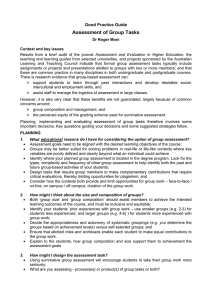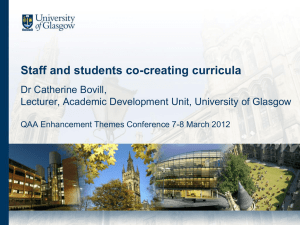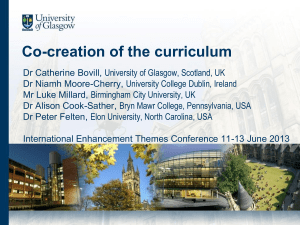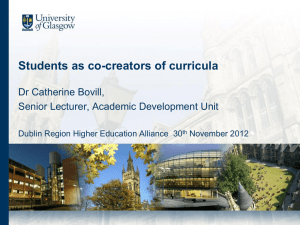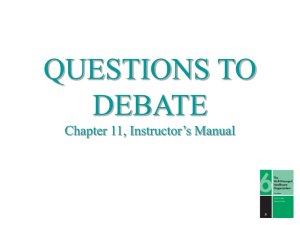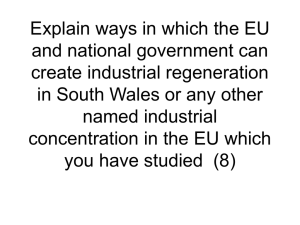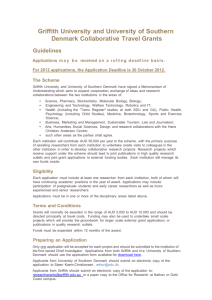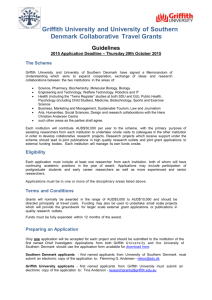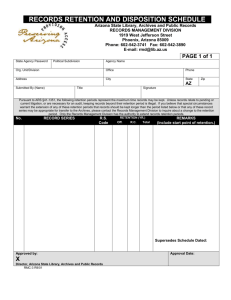Student retention and the first year experience
advertisement
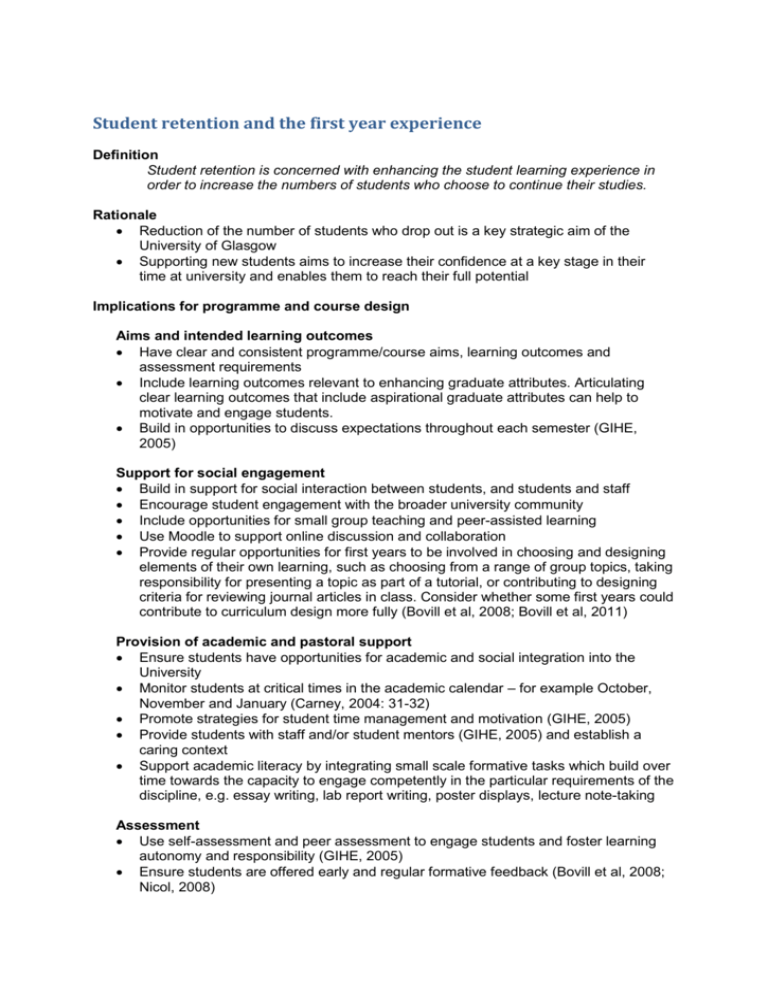
Student retention and the first year experience Definition Student retention is concerned with enhancing the student learning experience in order to increase the numbers of students who choose to continue their studies. Rationale Reduction of the number of students who drop out is a key strategic aim of the University of Glasgow Supporting new students aims to increase their confidence at a key stage in their time at university and enables them to reach their full potential Implications for programme and course design Aims and intended learning outcomes Have clear and consistent programme/course aims, learning outcomes and assessment requirements Include learning outcomes relevant to enhancing graduate attributes. Articulating clear learning outcomes that include aspirational graduate attributes can help to motivate and engage students. Build in opportunities to discuss expectations throughout each semester (GIHE, 2005) Support for social engagement Build in support for social interaction between students, and students and staff Encourage student engagement with the broader university community Include opportunities for small group teaching and peer-assisted learning Use Moodle to support online discussion and collaboration Provide regular opportunities for first years to be involved in choosing and designing elements of their own learning, such as choosing from a range of group topics, taking responsibility for presenting a topic as part of a tutorial, or contributing to designing criteria for reviewing journal articles in class. Consider whether some first years could contribute to curriculum design more fully (Bovill et al, 2008; Bovill et al, 2011) Provision of academic and pastoral support Ensure students have opportunities for academic and social integration into the University Monitor students at critical times in the academic calendar – for example October, November and January (Carney, 2004: 31-32) Promote strategies for student time management and motivation (GIHE, 2005) Provide students with staff and/or student mentors (GIHE, 2005) and establish a caring context Support academic literacy by integrating small scale formative tasks which build over time towards the capacity to engage competently in the particular requirements of the discipline, e.g. essay writing, lab report writing, poster displays, lecture note-taking Assessment Use self-assessment and peer assessment to engage students and foster learning autonomy and responsibility (GIHE, 2005) Ensure students are offered early and regular formative feedback (Bovill et al, 2008; Nicol, 2008) Teaching Use student-centred, active learning through problem-based, project-based and group learning, including field trips and work placements (Harvey et al, 2006) Include examples from real-world contexts to ensure relevance (GIHE, 2005) Make sure that first year courses are taught by senior experienced researchers as well as by other staff (GIHE, 2005) Examples Engineering Subject Centre Audit – Higher Education Academy http://www.engsc.ac.uk/teaching-guides/first-year/index.php/first-year-experience-audit/ Retention of Law students - Liverpool John Moores University http://www.ukcle.ac.uk/resources/directions/previous/issue14/brooman/ Resources National Audit Office report on student retention http://www.nao.org.uk/publications/nao_reports/06-07/0607616.pdf Student Transition and Retention Project http://www.ulster.ac.uk/star/ Griffith University Good Practice Guide http://www.griffith.edu.au/gihe/pdf/gihe_tipsheet_web_ese.pdf First year enhancement themes project publications http://www.enhancementthemes.ac.uk/resources/publications/first-year-experience References Bovill C., Cook-Sather, A. and Felten, P. (2011) Changing Participants in Pedagogical Planning: Students as Co-Creators of Teaching approaches. Course Design and Curricula. International Journal for Academic Development 16 (2) 133-145. Bovill, C. Morss, K. and Bulley, C. (2008) Curriculum design for the first year. First Year Enhancement Theme Report, Glasgow: QAA (Scotland). Carney, C. (2004) Withdrawn student analysis, University of Glasgow http://www.gla.ac.uk/media/media_9244_en.doc Griffith Institute for Higher Education (GIHE) (2005) Enhancing Student Engagement in the First Year - 10 Strategies for Success, Good Practice Guide, Griffith University http://www.griffith.edu.au/gihe/pdf/gihe_tipsheet_web_ese.pdf Hand, L. and Bryson, C. (2008) Student engagement. SEDA Special Paper no 22. London: Staff and Educational Development Association. Harvey, L, Drew, S and Smith, M (2006) The first-year experience: a review of literature forthe Higher Education Academy, York: HEA. Nicol, D. (2008) Transforming assessment and feedback. First Year Enhancement Theme Report, Glasgow: QAA (Scotland
